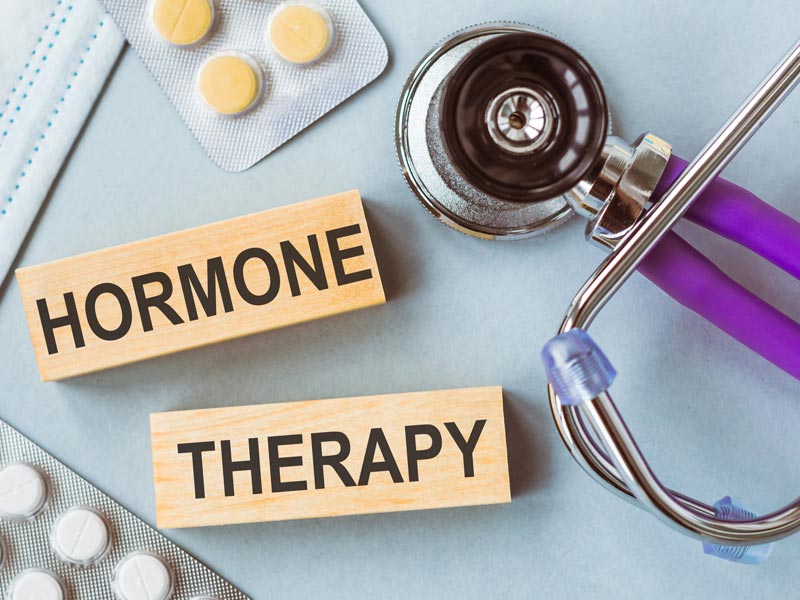USPSTF Draft Recommends Against Postmenopause Hormone Therapy
Update Would Apply for Prevention of Chronic Conditions in Most Patients
May 11, 2022, 12:25 p.m. News Staff — The U.S. Preventive Services Task Force is accepting comments on an April 19 draft recommendation statement and draft evidence review on the use of hormone therapy for the primary prevention of chronic conditions in postmenopausal people.

Based on a review of the evidence, the draft statement recommends against the use of combined estrogen and progestin for the primary prevention of chronic conditions in postmenopausal patients, and against the use of estrogen alone for the primary prevention of chronic conditions in postmenopausal patients who have had a hysterectomy. These are “D”-grade recommendations, and apply to asymptomatic, postmenopausal patients who are considering hormone therapy for the primary prevention of chronic medical conditions. They do not apply to individuals who are considering hormone therapy for the management of perimenopausal symptoms such as hot flashes or vaginal dryness, or to those who have had premature menopause or surgical menopause.
“Although we all want to find ways to stay healthy as we age, evidence continues to show that people who have already gone through menopause should not use hormone therapy to prevent chronic conditions,” task force Chair Carol Mangione, M.D., M.S.P.H., said in a USPSTF bulletin. “When used for this purpose, the harms of hormone therapy, such as an increase in the risk of blood clots and stroke, cancel out the potential benefits.”
While the timing of menopause is different for each person, the Office of Women’s Health states that the average age in the United States is 52. Although the menopausal transition is often referred to as “menopause,” according to the National Institute on Aging, true menopause does not occur until at least 12 consecutive months have passed without a menstrual period.
After menopause, people may be at increased risk for several common health conditions, including heart disease, stroke and osteoporosis. Other conditions that are more likely to occur after menopause include dry mouth, urinary incontinence, and increased risk for cavities and lead poisoning.
Story Highlights
Update of Existing Recommendation
When final, the draft recommendation will replace the task force’s 2017 recommendation on hormone therapy for the primary prevention of chronic conditions in postmenopausal women.
With only slight changes in language, the draft recommendation is consistent with the 2017 recommendation, which recommended against the use of combined estrogen and progestin for the primary prevention of chronic conditions in postmenopausal women, and against the use of estrogen alone for the primary prevention in postmenopausal women who have had a hysterectomy.
The AAFP supported the 2017 recommendation.
To update the 2017 recommendation statement, the task force commissioned a systematic review of the evidence on benefits and harms of systemic hormone therapy for the prevention of chronic conditions in postmenopausal individuals, and whether outcomes vary by age or timing of intervention after menopause. The task force said hormone therapy to treat menopausal symptoms such as hot flashes or vulvovaginal symptoms, or for other indications, was outside the scope of this recommendation.
The review consisted of articles published in Medline, the Cochrane Library and the Embase for English-language database through Oct. 12, 2021. The investigators also searched ClinicalTrials.gov, HSRProj, the World Health Organization’s International Clinical Trials Registry Platform and NIH RePORTER for unpublished literature, and reviewed reference lists of pertinent review articles and studies that met their inclusion criteria. Additional surveillance of the literature was conducted through Jan. 14, 2022.
A total of 84 articles representing 20 unique trials and three large controlled cohort studies were included in the review.
Findings, Research Gaps and Resources
The evidence review said hormone therapy “has a complex pattern of risk and benefits” in the primary prevention of chronic conditions, and that the risk-benefit profile of hormone therapy to prevent chronic conditions differs for women ages 50 to 79 years depending on the treatment regimen.
Overall, the review found that women who undergo hormone therapy for the primary prevention of chronic conditions experience some benefits, such as a reduced risk of fractures or diabetes. At the same time, the review found women who receive hormone therapy also are at an increased risk of some harms (including increased risk of stroke, thromboembolic events, gallbladder disease and possibly urinary incontinence), particularly among women older than 60.
The review also said that while some evidence suggests the age at which hormone therapy is initiated can modify the risk-benefit profile of some conditions (in particular overall mortality and cardiovascular events), with more favorable results in younger women, the available evidence on the benefits and harms of early initiation of hormone therapy is inconclusive
The investigators noted several research gaps, and called for more studies to determine
- whether the age or timing of initiation of hormone therapy relative to menopause affects health outcomes,
- whether the benefits and harms of hormone therapy might vary across population groups, and
- the comparative benefits and harms of different formulations and treatment durations of hormone therapy.
Finally, the USPSTF published an accompanying guide for clinicians and patients that provides a brief overview of the draft recommendation statement, offers links to external sources on hormone therapy, and outlines the process for submitting comments to the task force.
Next Steps
The task force will accept comments on the draft recommendation statement and draft evidence review until 11:59 p.m. ET on May 16.
All comments will be considered as the USPSTF prepares its final recommendation.